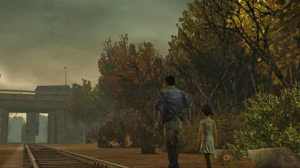THE WALKING DEAD: THE GAME
2012 Telltale Games
OVERVIEW
How far would you go to protect someone you loved? What kind of moral choices could you make about who lives and dies if you were forced to do so? How good are you at overcoming all the trappings of modern society in order to survive, while still keeping your soul, your basic morals, your ability to remain human? The Walking Dead: The Game strives to reveal the answers in a beautifully realized point-and-click adventure by indie developer Telltale Games.
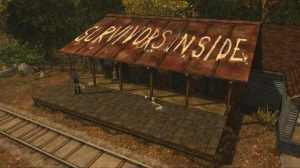
This game features the little-known “Clever Zombie”.
THE SETUP
The games opens with your character, Lee Everett, handcuffed in the back of a police car. You are introduced to simple and effective interface commands, allowing you to look around and make smalltalk with the old sherrif who is driving you to prison for what you discover is a murder you committed.
It’s not long before the zombie outbreak happens, though, and break out it does… suddenly, violently, overwhelmingly. The police cruiser is run off the road by one newly-infected walker, and tumbles into a ravine. This allows an injured Lee to kick his way to freedom, crawl from the wreckage, kill his first zombie, and begin the long journey to understanding and dealing with the nightmare all around him.
Early on, he meets Clementine, a 8-year-old little girl hiding a tree-house, awaiting the return of her parents from Savannah where the spread of the outbreak is implied. Lee, who never had children of his own, adopts Clem and fulfills the role of protector and teacher. This “protect Clem” dynamic infuses the game with most of it’s pathos and several grinding emotional challenges.
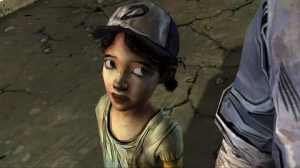
“It’ll be dark soon, and they mostly come at night… mostly.”
THE MECHANICS and GAMEPLAY
Telltale Games is made up of many programmers and designers from the old LucaAarts adventure game studio, a pedigree that most old-school gamers recognize as one of the best in the industry. If your game can claim designers from id software, LucasArts, Firaxis, Looking Glass or half a dozen other studios from the 90’s, it’s a pretty good bet that game is going to rock your socks off. The Walking Dead is no exception.
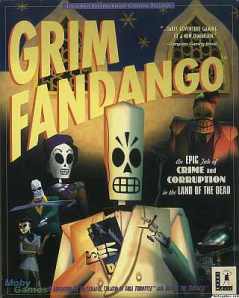
Another fine game by LucasArts veterans that features dead people.
There was an ease of use to old-school adventure titles like Grim Fandango, and a focus on story and plot not seen in many other games outside of Bioware (Mass Effect) or Remedy (Alan Wake) these days. Telltale strips those older systems down to their essence, and uses context-specific inventory, phrase-guided conversations (like Mass Effect of Dragon Age), and simple puzzle arenas to convey a gripping story of survivors as they try to make their way to Savannah, where one character has a boat. The choices you make in these conversations carry over from chapter to chapter, and affect characters in surprising ways. The major crux points of each episode are reviewed at the end, showing you a percentage average of how many other players made similar decisions. It’s intriguing to see how you stack up.
There is quite a bit of latitude within these choices, though. The group changes over the course of the game, presenting you with a rogue’s gallery of basically decent people. The Angry Guy, the Kid, the Techie, the Marksman, The Doctor, all familiar zombie apocalypse tropes. These characters come and go, dieing nobly, stupidly or randomly… but almost always becoming walker chow. Lee’s decisions for good or ill end up affecting the party as a whole, and Clementine in particular. For example, you can choose to try to “protect” Clem with words, lieing to her, telling her everything will be alright, that you’ll always be there to help her, and that her parents are still alive. This will keep her calm, but when the truths are eventually revealed, she will feel betrayed, and less likely to believe or help you in the end. Or you can give her the harsh truths, as gently as you can, and then tell her you will help her to be strong and survive, and take care of herself. These methods make the game more like a choose-your-own-adventure book than a game, per se, but what they accomplish within this nearly poetic restriction gives us a story with all the punch and drama of a multimillion dollar TV show.
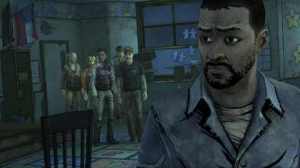
Lee must live with himself when he chooses to NOT tell the group that he switched the communal coffee pot to Decaf.
There are a lot of in-game cutscenes in The Walking Dead, sometimes lasting up to 5 minutes. As you play, you get used to the flow of these scenes and the pre-rendered decisions within them. The exceptions occur when the game forces you do to something really difficult. You, yourself, the player. You want to try to save that guy’s life by cutting his leg off with an axe? You’ll need to click on it, 3 or 4 times, each time listening to the screams of agony from the victim, blood splattering everywhere, and each blow landing with a sickening squishy crunch. Choose to kill an infected member of the party? Then YOU click the mouse and pull the trigger. YOU bear that euthanasia on your conscience. It’s a small thing, but the impact this simple interaction has during the most engaging and heartbreaking scenes hits you like a falling anvil, right in the feels.

AUGHgawd! My FEEELS!
It must not be left unsaid that there are a few drawbacks to these design choices. During the game, the pacing alternated between conversations with the group and swatting the Walkers in quick-time events that ramped up some pretty brutal tension. While the conversations were interesting and always revealed enough info to move forward (sometimes overdoing it a bit), I never felt like anything was beyond the capability of a casual gamer. One might say that this is also the pace of the comics and the TV show of the same name. That the point of both of those is the human connections made within the group, and how different personalities reacted to and dealt with the stress of seeing the world die all around them. The game does all that and more… But I gotta say, a bit more challenge would have been welcome, either puzzle-wise or in fighting off the zombies themselves. Inventory management might have been improved a bit also, since no one ever seemed inclined to wear a backpack or carry a machete, unless the plot called for it.
GRAPHICS, SOUND AND MUSIC
Telltale decided to go with cel-shaded graphics for The Walking Dead, and it was the right choice. It mirrors the original art from the Kirkman comics, paying homage to the world he created AND the tv show without forcing the narrative or crossing too many plot-lines. All the details look as if they were sketched with an art-school pencil (not “inked” like anime cel-shading), and the facial features were overdrawn enough to really differentiate the various characters you meet, sometimes going into moderate caricature. Again, this just works. Facial animation was also solid, with what looked like a lot of custom work…. an important factor when your game relies on attitudes, emotions and loyalties as much as Walking Dead does. Blood and gore effects were never completely over the top, but done in a delightful and almost lovingly sloppy fashion, also adhering to the same comic styling. The camera work, while serviceable through most of the game, really began to shine in the cutscenes of later episodes, switching positions to allow for the best angle to see puzzle elements. At some points, it was downright striking to see the viewpoint moving artistically, going for overhead shots and close-ups exactly when it felt like it should…. not something you usually expect from talking-heads in an adventure game or RPG.
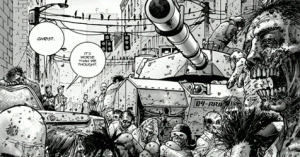
This Kirkman original went for $1.2 million at Sotheby’s last year.
The sounds design was decent but sparse in some areas. Guns sound like movie guns. Zombie heads go “splorch” and machinery (especially a locomotive you find in episode four) hisses and clangs with satisfying verisimilitude. The music was unobtrusive, and except for a few highlights during credit sequences or when a train hobo played his blues guitar, unmemorable. In this respect, I feel like perhaps Telltale wanted to do this part better, but instead put that funding into voice acting, animations and art design.
The voice acting itself was absurdly awesome. It’s easy to direct actors to scream. It’s much harder to direct them to scream in character. And conveying grief, loss, love and fear are all hallmarks of topnotch vocal talent. If these actors can’t get jobs at Pixar or Cartoon Network after this, there ain’t no justice in the world. Of special note is Lee himself. He speaks with authority, like the History Professor he used to be, or mumbles possible solutions to himself (and the player) while working a puzzle. The affection he feels for Clementine comes through in the warmth that comes through when talking her through very tough situations that NO 8-year-old should have to deal with.
As usual for a zombie game, there was a LONG list of vocal talent for the zombies themselves, and a nod should go to the vocal directors who gave these particular ghouls a unique sound… more grindy and breathy than growly, setting this pack apart from Left4Dead or the oeuvre of George Romero in the zombieshpere.
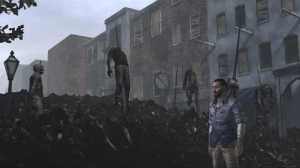
Dude, this mosh pit looks intense…
IN SUMMATION
I would recommend The Walking Dead to anyone who likes the AMC show or the comics. It’s not twitch-based or logically difficult, and the story is WELL worth the price of admission. It is literally the only game I’ve ever played where I shed a tear of two over the course of play. If you don’t go into it expecting a bang-up action game, but instead make some considered moral choices, the resulting plotlines are better than most TV shows.
Modern zombie fiction tells us different things about ourselves, and the decisions we feel we’re capable of making in a crisis. Stories like World War Z or Mira Grant’s Newsflesh trilogy show us how we manage to survive it and LIVE… both as a cohesive culture and in retaining our humanity in the face of nearly overwhelming odds. Stories in games like Left4Dead or The Walking Dead show us how we survive it and DIE… and how we are remembered (or dismembered). When all that remains is how we treat each other, when survival means being able to trust your group, when a little girl’s life may depend on crushing her heart by telling her a hard and bitter truth… How long can you go? How long can you squeeze the last bit of your soul for something good and decent when the entire remainder of the human race is trying to eat you?
In the end, all these zombie tropes are a metaphor for good people forced to choose between equally bad decisions. For in the end, the title isn’t about the zombies at all…. it’s about us, the remaining few, the survivors, the real Dead men Walking.

